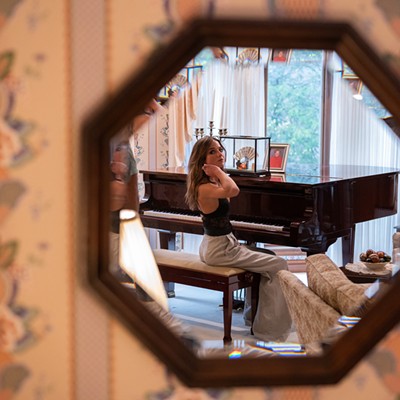Gitti is dating up. She's a spirited, talkative, optimistic gal with a good sense of humor, a PR rep for a music company, bright but not intellectual, who likes to go disco dancing on a Saturday night. Her new boyfriend, Chris, is an architect, and apparently a talented one, with principles so high that sometimes he foregoes opportunities. He doesn't mind if she cuddles while he reads, but he does like her to stop talking, and he limits the amount of TV she can watch.
They don't seem to make sense as a couple, except it seems that they do. In Everyone Else, the promising young German writer/director Maren Ade explores the dynamic of their relationship as they vacation at his parents' home in Sardinia, where they bump into Hans, Chris' overbearing neighbor and fellow architect from back home, and his newly pregnant wife, Sana, a clothing designer. The couples have two dinner parties, one at each of their homes, and each one is a subdued disaster.
This isn't the kind of movie that a lot of people will watch in English, let alone in German, even if it's as thoughtful and well made as Everyone Else. It's a series of episodes in a still very unstable relationship, each one weighted more or less equally, so you have to pay attention. Early on, we don't know much about them, and Ade doesn't waste our time with expository dialogue. The characters' biographies unfold gradually, as do their conflicting points of view.
Ade tells her story in two parts: For an hour, we watch the sanguine Gitti (Birgit Minichmayr) and the disenchanted Chris (Lars Eidinger) talk, eat, dance and canoodle, all rather comfortably. He's an idealist who's afraid to commit to an idea because it will interfere with other ideas to which he also can't commit. She tells him that he needs to take risks, that thinking so much causes him to lose the name of action (not her words -- nor mine, of course -- but she does seem to know who Brunhilde is).
Chris responds to her analysis with, more or less: Who asked you? But later, when Hans says the same thing, only more aggressively, she defends Chris against his adversary's assault. His reply this time to Gitti: "You're so embarrassing." This exchange comes at the halfway point in Ade's two-hour film, and the next morning, Chris and Gitti go hiking -- that is, walking gingerly over rough isolated terrain -- as their relationship continues to tangle and unfold.
At the heart of Everything Else is the insidious nature of insecurity, which creeps into our lives like a fog that threatens to obscure what's right in front of us. Whether this couple or any couple can survive a lifetime of intimacy is a crapshoot, but it certainly won't survive if the partners don't speak up (and speaking up might just be what kills things). "Sometimes I want so badly to be different for you," Gitti tells Chris. If she were different, she could get to know him in a different way -- and then he admits that he thinks he's too boring for her (which he is).
There's also the issue of children. Everyone Else opens with a family set piece in which Chris' pouty little niece Rebecca decides she doesn't like Gitti. So Gitti goes with her gut: She invites the brat to declare that she "hates" and "detests" her, and then she tells Rebecca to use her finger as a gun and shoot her, and Gitti falls into the swimming pool fully clothed and dies. Cut to something else -- the scene stands alone for us to make of it what we will.
Everyone Else is casually acted and smartly done: careful, insightful but never preachy or overbearing. Its appropriately ambiguous ending is at once languid and abrupt. I look forward to more good work from Ade, who seems to understand something essential about what we think, feel and do. In German, with subtitles.

Starts Fri., May 14. Harris















